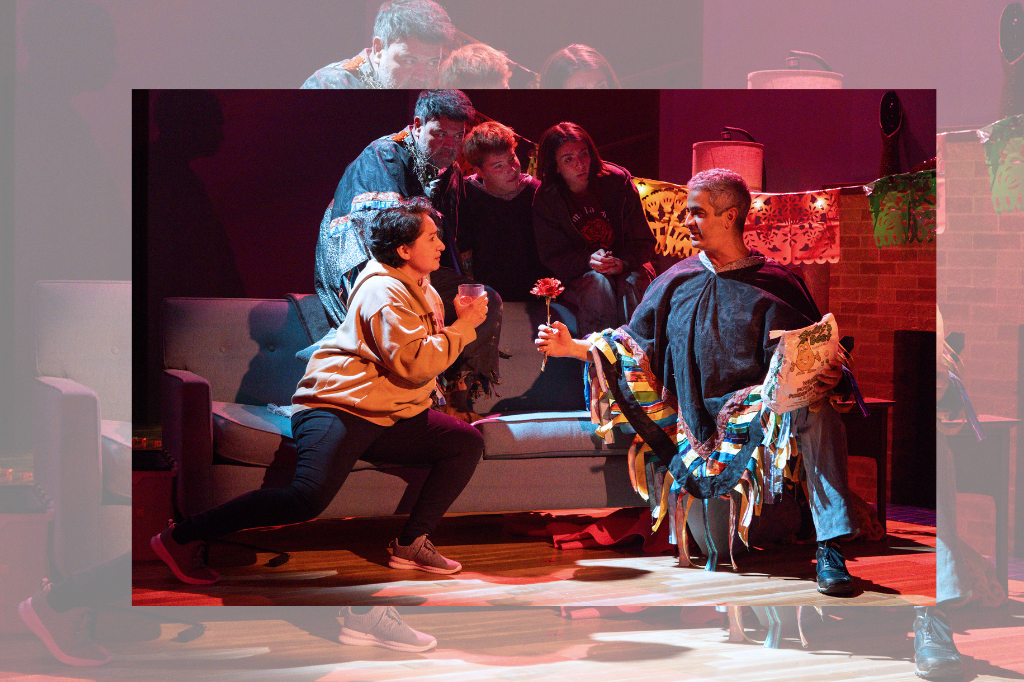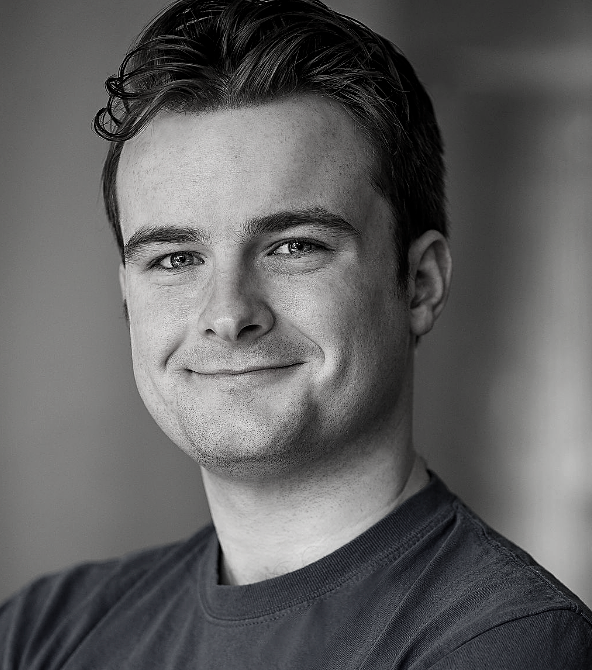REVIEW: Tarragon’s El Terremoto offers a delicate look at a family navigating disaster
When the earth splits open, what gets lost in the gap? For the central family of Christine Quintana’s El Terremoto, directed by Guillermo Verdecchia at Tarragon Theatre, the answer is something like: a youngest sister’s knowledge of Spanish, the orderliness of a bookshelf, a pair of parents, the hinges of a door, two Vancouver bridges, and the boundary separating life and death.
Yet in this delicate look at a family navigating disaster — a world premiere drawing inspiration from both Chekhov’s Three Sisters and Quintana’s life — hope never evacuates. Don’t expect to recover what’s gone, but with a bit of work, the cracked pavement of this blue-grey city by the sea might once again feel like home.
El Terremoto, playing in the Mainspace with a runtime of two hours and 20 minutes including intermission, concerns the three Jurado sisters: Luz (Mariló Núñez), the eldest, a pragmatic professor; middle child Rosa (Miranda Calderon), an erratic condo architect; and Lina (Margarita Valderrama), youngest by a long shot, a student unhappily enrolled at the University of British Columbia. Their parents died when Lina was one, so the three live together with their Abuela (Rosalba Martinni). Luz takes up the role of matriarch.
The play at first masquerades as a quotidian coming-of-ager, with Lina the edgy protagonist. Returning to the family home in East Vancouver after class on her 21st birthday, she finds a cheery celebration waiting for her. While her non-binary partner Tash (Caolán Kelly) enjoys the earnest vibe — even family friend Henry (Michael Scholar Jr.) and eccentric neighbour Omar (Sam Khalilieh) get in on the heartfelt toasting — Lina finds it suffocating. She wants to bolt out the door, mount her bike, and pedal until she reaches the village in Mexico where her Abuela grew up. The life she’s been thrust into isn’t for her.
At the very end of Act One, an earthquake, un terremoto, strikes, prompting sound designer Alejandra Nuñez to send forth a seat-shaking rumble before a complex intermission changeover of Shannon Lea Doyle’s detailed set leaves the Jurados’ homely living room almost in shambles. Books have tumbled from their shelf, carpets have disappeared, and a pile of boxes has taken over the kitchen table. Outside, chaos ferments, threatening to shut down Vancouver. The tone borders on dystopian.
As the earth fractures, so too does the play’s theatrical logic. Although the first act is more or less realistic — only a single, spellbinding visual gesture, calibrated by lighting designer Michelle Ramsay and projection designer Samay Arcentales Cajas, hints that all may soon crumble — in the second, time and space bend in unexpected ways. Verdecchia complements this change with a busier, less literal visual style, almost maximalist after the preceding verisimilitude. Lina, disturbed by these happenings, wonders if she’s hallucinating, but Tash calms her (and the audience): “Nah babe it’s cool, magical realism is a cornerstone of Latin American art.”
This generic swerve works because it serves to excavate already established relationships. And it does so with success. As a character study, Quintana’s play is potent. While many shows with large casts — including The Inheritance and Soulpepper Theatre’s recent production of Inua Ellams’ Three Sisters — use their ensemble of characters to paint a broad portrait of a cultural moment, El Terremoto acts in a different manner: it seems to me the wider contexts the play invokes, including its engagements with Chekhov and history (the production’s resource guide brings up the 1985 Mexico City earthquake), exist in large part to deepen our understanding of the Jurado family.
The fact that El Terremoto revolves around a young Canadian grappling with how she is or isn’t living up to the legacy of her ancestors means the show resembles several recent Tarragon offerings, from Three Women of Swatow to A Poem for Rabia — but Quintana’s attention to character sets it apart, making it my favourite thing I’ve seen at the theatre since Anosh Irani’s tender Behind the Moon.
Quintana dramatizes the struggle of putting complex emotions into words. Contemplating the 20th anniversary of losing her parents, Luz tells Omar:
I’m the same age mom was, when she died.
And I just keep thinking, like
If this was it
What would I have to —
I don’t know.
Not a fully formed thought.
This is a winding forest road of a passage, the comma that diverts the natural grammatical flow of “mom was, when she died” an elegant early sign of Luz’s thought not being “fully formed.” (I’ve reproduced the script’s formatting.) And Verdecchia ensures Núñez builds additional ups and downs into its gravelled surface through body language and breath; during the first act, the whole cast commits to a craggy, detail-heavy, at times nearly mumblecore performance style, laying out the foundation of the play’s world with cohesion. Act Two’s turn toward magical realism sees the actors move in different directions, with Abuela and the sisters remaining in a dramatic, down-to-earth register while the supporting cast plays broader, more comic.
Doyle’s set buttresses the show’s project of capturing seemingly peripheral goings-on. To the left of the Jurados’ living room is a small, porch-like space, connected to the house through a side door. It’s pressed up against the wall of the theatre, making it claustrophobic, narrow, like a crack in the earth’s surface. On this grey stoop bordered by walls of leaves, events not ready for the house take place: secrets are revealed, conflicts hashed out, kisses had. The tertiary nature of this space contrasts the architectural primacy of the house’s front door, which is so central and upstage that it exudes the surreal energy of a portal to another world.
From the moment Lina enters through the side door and finds a wall of loved ones insisting she have a joyful birthday, El Terremoto explores the concept of happiness. How should one think about such a state when their parents are gone? When disaster strikes? In the play’s dying minutes, Lina receives matching advice from two different family members. They suggest she recognize the happiness she does have and hold it close while possible — an admirable course of action difficult to carry out when the globe’s very crust seems to be encouraging despair.
El Terremoto runs at Tarragon Theatre until April 21. Tickets are available here.
Intermission reviews are independent and unrelated to Intermission‘s partnered content. Learn more about Intermission‘s partnership model here.















Comments